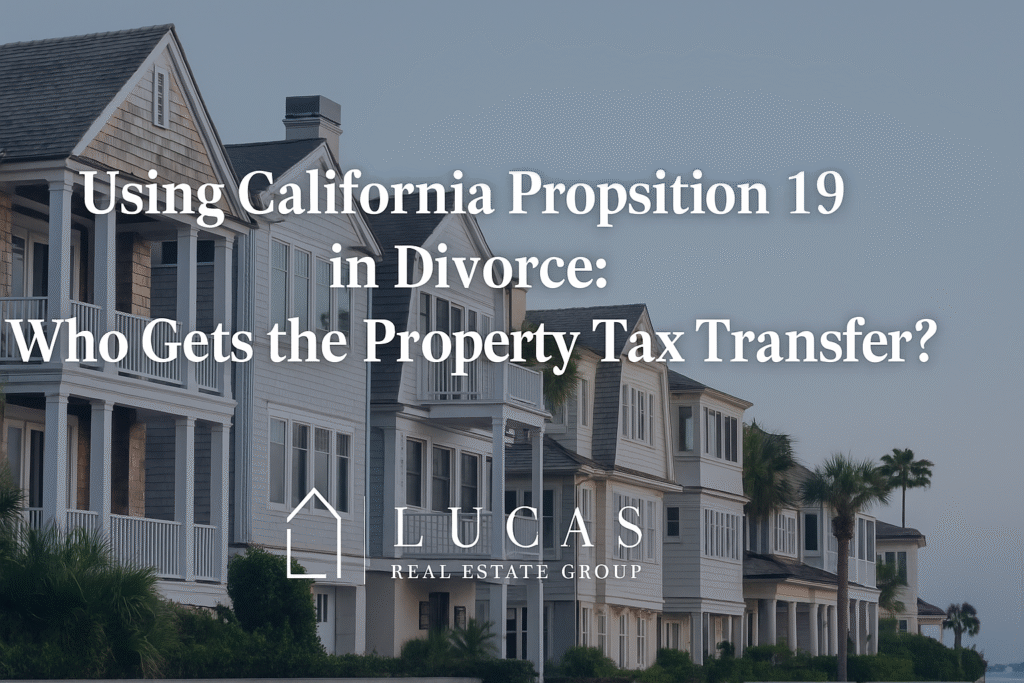Navigating divorce is difficult enough—don’t let California Proposition 19 (Prop 19) add to the confusion. Learn how property tax base transfers work under Prop 19 when divorcing spouses own a shared residence.
Divorce can be one of the most stressful and complex life events—and for homeowners in California, Proposition 19 (aka Prop 19) adds another layer of nuance to consider. One key question we often hear: Who gets to transfer the property tax basis under Prop 19 during a divorce? This can be particularly valuable in high appreciation areas like Newport Beach and Coastal Orange County, where a married couple who purchased their home long ago likely enjoys favorable Prop 13 property tax rates saving thousands of dollars per year if they were to lose the benefit.
Proposition 19 and Base Year Value Transfers: A Quick Recap
Prop 19 allows eligible California homeowners (age 55+, severely disabled, or wildfire/disaster victims) to transfer their existing property tax basis to a replacement property of equal or lesser value up to three times in their lifetime. This can result in substantial annual tax savings.
However, when it comes to divorce, only one person can use the base year value transfer—not both.
Divorce and Property Tax Transfers: What the Law Says
In divorce situations, spouses must agree on who will claim the Prop 19 tax base transfer when selling their shared primary residence. The law doesn’t allow both parties to claim the benefit. If both are eligible (e.g., both are over 55), then it’s first-come, first-served.
Section (g)(2)(A)(iii) of California Property Tax Rule 462.540 mandates that only one spouse or former spouse may transfer the base year value in an interspousal transfer.
While Rule 462.540(g)(2)(A)(iii) clearly mandates that “only one spouse or former spouse may transfer the base year value”, the burden of enforcement appears to fall on the honor system and assessor discretion. The form relies on the the applicant’s certification under penalty of perjury that all information provided is accurate. This creates a practical gray area in divorce cases unless the claim is contested or flagged by the assessor’s office.How This Works in Practice
- Only one person can file a claim under Prop 19.
- The assessor’s office will not approve multiple transfers from the same original property.
- The right should be negotiated and documented in the divorce settlement.
- It’s common to include a written waiver from the non-claiming spouse.
- If not agreed, the first to complete the purchase and file may receive the benefit.
Importantly, the official claim form (BOE-19-B) does not include questions about divorce or interspousal use. This makes it crucial for parties to coordinate privately to avoid errors, delays, or disqualification.
Key Considerations in Divorce Settlements
- Eligibility is limited to those 55+ or otherwise qualified.
- Applies only to a principal residence that was reassessed on sale.
- Transfer must occur within two years of the sale.
- Only one spouse can claim the benefit — document it clearly.
How We Can Help
At Lucas Real Estate Group, we routinely help clients navigate real estate sales involving legal and tax complexities—including Proposition 19 transfers, divorce settlements, and more.
Led by Devin R. Lucas, REALTOR®, Real Estate Attorney, and Real Estate Broker, we serve Newport Beach, Eastside Costa Mesa, and surrounding Orange County communities in partnership with Coldwell Banker Newport Beach and the Coldwell Banker Global Luxury program.
Questions or Need Help?
If you are selling California real estate following a divorce or want to explore Proposition 19 property tax transfers, we’d love to help.
Email us at info@lucas-real-estate.com or call 949-478-1623.
— Devin R. Lucas
Real Estate Broker, REALTOR® and Real Estate Attorney, specializing in Newport Beach, Costa Mesa, and Orange County coastal communities.
Sources
- California State Board of Equalization, Property Tax Rule 462.540
- California Constitution, Article XIII A, Section 2.1
- California Revenue & Taxation Code §§ 60, 63.3
- Board of Equalization Letters to Assessors: LTA 2021/019 & 2024/044
- BOE-19-B (Orange County Assessor’s Form)
Connect With Us
Check out our countless 5-star reviews and follow us on social media:
| Google Reviews | Yelp | LinkedIn | Zillow | Avvo | Facebook | Twitter | Instagram | YouTube | Official Site | Blog | Newsletter |
Sign up for our Newsletter here
—-Disclaimer —-
The content on this blog is for informational purposes only. Nothing on this blog should be construed to be legal advice, and you should not act or refrain from acting on the basis of any content on this blog without seeking appropriate legal advice regarding your particular situation, from an attorney licensed to practice law in your state. The content on this blog is not guaranteed to be correct, complete, or up to date. Devin R. Lucas’ office is in Newport Beach, California and is only licensed to practice law in California. Please be advised that Devin R. Lucas only provides legal services or advice pursuant to a written legal services agreement. The content on this blog is not intended to, and does not, create an attorney-client relationship between you and Devin R. Lucas, nor does our receipt of an email or other communication from you. Some jurisdictions may consider this site to constitute attorney advertising; accordingly, please be advised this is an advertisement.
IRS CIRCULAR 230 DISCLOSURE: To ensure compliance with requirements imposed by the IRS, we inform you that, to the extent this communication (or any attachment) addresses any tax matter, it was not written to be (and may not be) relied upon to (i) avoid tax-related penalties under the Internal Revenue Code, or (ii) promote, market or recommend to another party any transaction or matter addressed herein (or in any such attachment).

